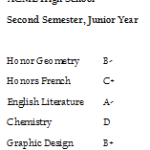Yield (or Admission Rate) is the percentage of students admitted into a College that choose to enroll in that College. Stanford, the most selective College in the country, has a much higher yield than your local State College. Why? Other than lacking funds to pay for it, not too many kids get into a school like Stanford and decide they’d rather go elsewhere. Part of this desire may be due to a deservedly earned reputation for excellence, for the prestige of graduating from a renowned University and part of this desire may be for the ego-boosting feeling of being accepted to a College that is difficult to get into. Does the College accept exceptional students that create an excellent atmosphere? Does the College’s excellent atmosphere create exceptional students? There is something to both, but this is a classic question of the chicken and the egg.
Why is Yield so important?
- Admissions is a big-money game for Colleges. Non-subjective factors such as yield, or admission rate, can have a big impact on how Colleges are viewed by prospective students and how they are rated by publications such as the US News & World Report Best Colleges. Colleges want a high yield. Higher admission rates (yield) is considered a reflection on the Colleges desirability/selectivity. In other words, a student is more likely to enroll into a College if they are accepted, if they believe other students are more likely to enroll into that College if they are accepted. They also are more likely to apply to that College if they consider it to be highly selective, which is reflected in both its acceptance and admission rates.
-
Colleges must make some educated guesses on how many students to admit into their schools to get the number of students they want enrolled in the schools. If their historical yield is 35%, they may choose to admit 10,000 Freshman, in the hope of enrolling 3,500 Freshman. But if it happens that 4,000 of those 10,000 admitted students chooses to enroll, the College needs to figure out how to accommodate an unforecasted 500 students, both in terms of teachers/classrooms and housing. Next year, they may decide to lower the number of admitted students, both because the school already has 500 unforecasted students in their total student body and because they are wondering if last year’s 40% yield is their new norm.
Now you know why College Admissions becomes a real-life application of Statistics.

Colleges must determine how many students to admit in order to enroll the desired number of incoming Freshman
Furthermore, if a school chooses to change an Admission policy, they have to consider what impact that policy will have on their yield – if they determine their diversity is suffering as their selectivity increases, they may choose to admit more minorities. If they are generous with their financial and/or merit aid for those minorities, than the yield for that sub-group will likely be higher.
Colleges that choose to offer an Early Decision Application Plan are eliminating the guesswork on the yield for a portion of their admitted students, because ED plans are binding – the student must enroll if they are accepted via ED.
Why do you need to understand yield? It helps you understand the Admission process, which helps you make wiser decisions about applying, and whether to apply early. See Early Decision, Early Action, Restrictive Early Action, Regular Decision and Rolling Admission for more detail to help you understand the potential impact on your admissions chances when you apply early to a College. Furthermore, Colleges with a high yield are less likely to offer merit money, because students clearly value admission into Colleges and may be willing to pay more to attend that College. If you are applying to Colleges with a high yield, you should pay close attention to the percentage of students that receive financial or merit aid, if that is important to you. Keep in mind that student athletes and children of alumni may apply early, and receive special consideration for acceptance. Those students may skew the numbers. |









